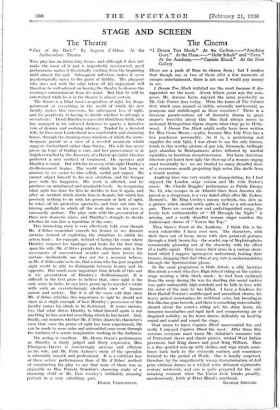Goes." At the Flaza.—"Hohe Schule" and "Faust."
At the Academy. "Captain Blood." At the New Gallery HERE are a pack of films to choose from ; but •I confess that though one or two of them offer a few moments of meagre entertainment, there' is not one I would pay money to see. "
• I Dream Too Much irritated me the most because it dis- appointed me the most. About fifteen years ago the com- poser, • Mr. Jerome Kern, enjoyed the same popularity as Mr. Cole Porter does today. Were the tunes of The Cabaret Girl, which once seemed so richly, sensually sentimental, as pompous and middle-aged as these numbers ? There is a tiresome pseudo-serious air of domestic drama (a great singer's love-life) about this film that always seems to Surround Metropolitan Opera singers when they go to Holly- wood. I Dream Too Much might really have been written for Miss Grace Moore,—a pity,- because Miss Lily Pons has a less ponderous personality. As it is, a performing seal supplies the only light, I was about to say the only human, touch in this worthy picture of gay (oh, tiresomely, triflingly gay) abandon in Montparnasse attics followed by marital squabbles in luxurious reception-rooms. Nor have American directors yet learnt how ugly the close-up of a woman singing must invariably be ; we are treated to many dreadful shots of a cavernous mouth projecting high notes like shells from a trench 'mortar. • Anything Goes was very nearly as disappointing, for I had enjoyed the London stage version and Mr. Cole Porter's music. Mr. Charlie Ruggles' performance as Public Enemy No. 13, who escapes in an Atlantic liner from America dis- guised as a clergyman, is a very faded affair after Mr. Sydney Howard's. Mr. Bing Crosby's moony methods, too, slow up a picture which should rattle quite as .fist as a sub-machine gun. There are several new and undistinguished. songs, the lovely lush sentimentality of " All Through the Night " is missing, and a really dreadful woman singei murders the Audenesque charm of " You're the TOp."
Then there's Faust at the Academy.' I think this is the
worst colour-film I have ever seen. The characters, with their faces out of focus, move with slow primeval gestures through a thick brown fog—the scarlet cap of Mephistopheles occasionally gleaming out of the obscurity with the effect of a traffic signal. They weave their arms in a curious short- hand which I suppose opera-goers understand, beating their breasts, dragging their feet (this at any rate is understandable) throUgh the Spectracolour gloom.
In the same programme is Hohe Schule, a silly Austrian film about a count who does High School riding on the variety stage wearing a little black mask : he had been cashiered from the army during the war for duelling (WS "secret motive was quite unbearably high-minded) and he falls in. love with the sister Of the man he has killed. I have a "fondness for Herr Rudolf Forster's middle-aged and unresilient charm, his heavy period moustaches, his well-bred voice, but breeding in this film has gone berserk, and there is something indescribably absurd about the count's riding act, his shiny boots, his immense moustaches and rigid back and overpowering air of disguised nobility, as his horse dances delicately on hoof-tip round and round and round the stage.
That seems to leave Captain Blood unaccounted for, and really I enjoyed Captain. Blood the most. After three film versions everyone must know Mr. Sabatini's romantic tale of Protestant slaves and 'chaste pirates, wicked West Indian governors; bad King JaMes and goad King William. Here is a fine spirited mix-up with clothes and wigs which. some- times hark back to the sixteenth century and sometimes forWard to the period Of Wolfe. One" is hardly surprised, therefore, by the magnificently wrong ehatacteriation Of dull grim virtuous James 'as a -wicked witty debonair eighteenth- century aristocrat; and One is quite prepared for the cul- minating moment when-The Union Jack breaks proudly, anachronaugy, forth' at Peter Blood's Masthead.
' Gaiiii.km GREENE.
. .














































 Previous page
Previous page